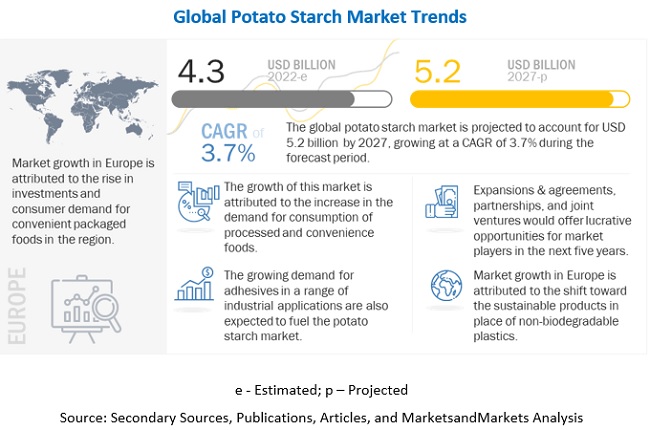Potato Starch Market | Opportunities | Challenges
The Potato Starch Market is estimated to be valued at USD 4.3 billion in 2022. It is projected to reach USD 5.2 billion by 2027, recording a CAGR of 3.7% during the forecast period.
The global potato starch market has been influenced by some of the macroeconomic and microeconomic factors witnessed in some key countries. This would prove strong enough to drive the market significantly in terms of value sales during the forecast period. With the rise in demand and preference for natural food ingredients, the trend of clean-label and plant-based products has significantly boosted the utilization of potato derivatives in the food industry. Potato starch is used as a binder, and this enhances its properties, such as smoothness, hardness, gloss, and whiteness.
Opportunities: Strong market potential for potato starch-based bioplastics
Bioplastics are plastics derived from biological materials and are biodegradable. These are made from renewable sources and are increasingly being preferred in packaging, food service, consumer electronics, agriculture/horticulture, consumer goods, automotive, and household applications. According to European Bioplastics, in 2020, the global production of bioplastics stood at 2.11 million tons, with packaging accounting for 47% of the application area for bioplastics. The global bioplastics market is set to register a growth of 36% between 2021-2026, driven by investments from countries, including China, the US, and European countries.
Challenges: Operational challenges associated with modern potato starch production processes
With the advancement in technologies and production processes across the manufacturing sector, the production of potato starch is a highly competitive market. Along with highly technical production processes, the consumer demand for quality products has risen tremendously. The demand is also high in terms of volume for various food, feed, and industrial applications.
The key players in this market include Tate & Lyle (UK), Emsland (Germany), Ingredion Incorporated (US), and Avebe (Netherlands).

Comments
Post a Comment